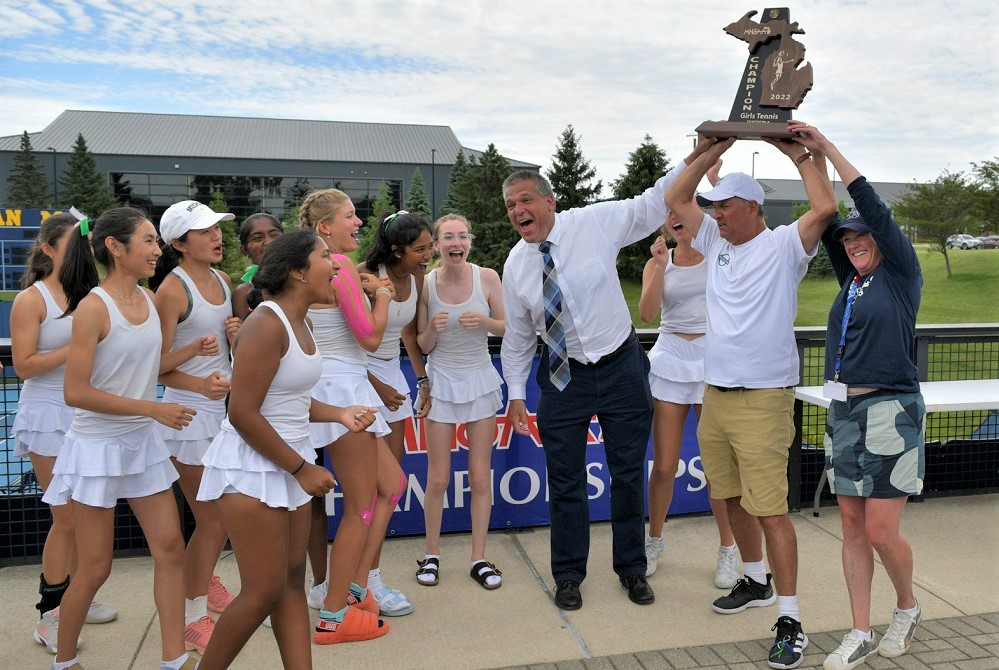
Thank Roosevelt for Football Weekends
December 20, 2013
By Rob Kaminski
MHSAA benchmarks editor
The next time you find yourself immersed in a tense crosstown football rivalry on a Friday night followed by a Saturday pilgrimage to the nearest college campus and a Sunday afternoon with a remote and your favorite snacks and beverages, take a moment to consider what the weekend would be like if it weren’t for Teddy Roosevelt.
The man who became our 26th President shortly after the turn of the 20th Century following the assassination of William McKinley in 1901 was a football fan like you. Maybe more so.
Today’s game of football has reached a critical crossroads. Player size and speed have increased across the board. Savage use of equipment as weapons rather than protective gear has been glorified on television networks and social media. Leaders of the game at all levels have recognized the need for change, employing new rules and widespread educational efforts to aid in preserving the sport.
History, as they say, is repeating itself.
In an ironic twist, it was Roosevelt who saved the then-brutally violent game of football from itself more than 100 years ago. Yes, the same “Rough and Ready Teddy” who led the charge up San Juan Hill during the Spanish-American War and often sparred in the boxing ring while in office from 1901-09 opined that football was becoming so gruesome that he delivered an ultimatum: clean up the game or it would be outlawed.
The Chicago Tribune reported that in 1904 alone, there were 18 football deaths and 159 serious injuries, mostly among prep school players. Football deaths suffered by younger players were reported on a nearly weekly basis, as outraged citizens called on colleges and high schools to banish football outright.
In stepped Roosevelt, who called head coaches and representatives from Harvard, Yale and Princeton – college powers at the time – to the White House in 1905 urging them to eliminate excessive violence and set an example of fair play for the rest of the country. When the casualties actually rose by one during the ensuing season, Roosevelt reacted with greater resolve and convened leading football authorities for the purpose of authoring drastic rules changes. What emerged was an intercollegiate conference which was the predecessor of the NCAA.
Among the most effective changes for the 1906 season were the legalization of the forward pass, the elimination of mass formations, and the creation of a neutral zone. Football fatalities fell to 11 in each of the next two seasons, and severe injuries fell drastically.
Thanks to the introduction of protective equipment and ever-evolving rules changes, football during the 100-plus years to follow has become an exponentially safer game. Yet, the game’s leaders always will need to adjust and react to scrutiny that comes with the territory.
So, as the game once again undergoes rules modifications in the name of safety, give a tip of the cap to President Roosevelt while you enjoy college bowl season and the NFL playoffs and begin to think ahead to the first high school practice of 2014.

Ann Arbor Greenhills Athletics Recognized as 'Exemplary' by NIAAA
By
Geoff Kimmerly
MHSAA.com senior editor
July 29, 2022
Ann Arbor Greenhills’ athletic department has been selected for a Quality Program Award from the National Interscholastic Athletic Administrators Association (NIAAA), becoming the first Michigan school to receive the exemplary-level honor since the QPA was introduced in 2009.
Programs were considered by the NIAAA based on 10 assessment categories that aspire to “encourage measurement, planning and goal setting aimed at continuous improvement of local school athletic programs.” Greenhills will be recognized for the achievement during December’s NIAAA/NFHS National Athletic Directors Conference in Nashville, Tenn.
Greenhills sponsors 21 sports, and 247 of the school’s 355 students during the 2021-22 school year participated on at least one team.
"At Greenhills, we have always prided ourselves on continuous improvement, and aim to provide an exemplary experience for all of our student-athletes,” athletic director Meg Seng said. “The NIAAA Quality Program assessment guided us through a comprehensive examination of our entire athletic program. This exercise affirmed many of our strengths and also highlighted areas in which we can continue to improve.
“We remain motivated to measure, innovate and improve our program to benefit the student experience. While we are extremely grateful and proud for the recognition, the true value came while engaging in a thorough audit and working alongside dedicated colleagues during the process."
Greenhills previously received an Exemplary Athletic Program Award in 2017 from the Michigan Interscholastic Athletic Administrators Association (MIAAA).
PHOTO The Ann Arbor Greenhills girls tennis team celebrates its Lower Peninsula Division 4 championship won last month. (Click for more from High School Sports Scene.)

